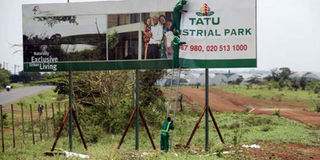Greed, deceit and a web of underhand deals, the sad story of Tatu City

Workers put up the Tatu City industrial park signage on April 22, 2015. How a multi-billion-shilling venture turned into a near fiasco is the story of raw power, power abuse, suspicion, mistrust and boardroom wars which spilt into courtrooms in both Nairobi and Mauritius. PHOTO | DIANA NGILA | NATION MEDIA GROUP
What you need to know:
- To cash in on the new housing demands, one of Belgium’s rubber and coffee companies, Socfinaf, had started scouting for buyers of its 13,500 acres of coffee estates in Kiambu County — but with little success.
- In total, they had put in $84.3 million and ended up with nine coffee estates and 22 land titles. They renamed the property Kofinaf Company Limited.
- With more than $100 million invested in Tatu and the purchase of the Kofinaf estates, company details show that they had paid Mr Nyagah $818,000 (Sh81 million) for his services as a board member.
Twenty-six kilometres north of Nairobi, a giant sign announces the entrance to Tatu City, a proposed 2,500-acre sprawling piece of real estate, which was expected to be a major satellite city but has instead turned into a massive tale of suspected graft and corporate intrigue.
How a multi-billion-shilling venture turned into a near fiasco is the story of raw power, power abuse, suspicion, mistrust and boardroom wars which spilt into courtrooms in both Nairobi and Mauritius.
The principal characters are now all too familiar: New Zealand millionaire and investor Stephen Jennings; Vimal Shah, the face of the Thika-based Bidco Africa; Nahashon Nyagah, a former Central Bank of Kenya governor and Stephen Mwagiru, a local tycoon.
The investment again grabbed headlines in the past week when lawyer Ahmednasir Abdullahi accused Director of Criminal Investigations Ndegwa Muhoro of complicity in an attempt to rob the main investors of their stake in the business.
The tale began when, eager to cash in on the growing economy in the Mwai Kibaki years and the unprecedented property boom that started in the mid-2000s, Mr Shah approached Mr Jennings with an offer to build one of East Africa’s largest real estate projects.
Land was plentifully available, north of Nairobi in the Ruiru area, where former colonial coffee farms were slowly giving way to real estate.
To cash in on the new housing demands, one of Belgium’s rubber and coffee companies, Socfinaf, had started scouting for buyers of its 13,500 acres of coffee estates in Kiambu County — but with little success.
That is the land that the consortium of Mr Nyagah, Mr Shah, and Mr Mwagiru were targeting. But they didn’t have the money to execute the deal.
“(Shah) proposed that my business put up 100 per cent of the money to buy 2,500 acres at Tatu. He also suggested we pay for an option to buy the 11,000-acre Kofinaf estates,” Mr Jennings said at an investor briefing.
“Shah and his partners also agreed that my business should have management control of the project by appointing the majority of board members. Given that I was putting up 100 per cent of the money this was a pre-condition of my participation.”
THE DEAL
Mr Jennings had approached another UK investor Robert James Reid and convinced him to put his faith and money into the Kenyan project.
Mr Jennings knew little about the land — and the local political and economic dynamics. “Shah was charming and persuasive,” he would later say.
“He promised that he and his partners would do everything possible to assist the project; he assured me that there would be no political or legal obstacles to the rapid development of Tatu City.”
With that, Mr Jennings and his international partners, through their company Renaissance Partners Investment Limited, wired on July 8, 2008 some $21.8 million (Sh2.2 billion) as their investment in Tatu City and another $62.5 million (Sh63 billion) in March 2010 to purchase the Kofinaf estates.
In total, they had put in $84.3 million and ended up with nine coffee estates and 22 land titles. They renamed the property Kofinaf Company Limited.
Mr Jennings says in court records that he extended to Mr Shah, Mr Nyagah and Mr Mwagiru “a loan of almost $11 million to enable them to participate in the purchase of Tatu City” — meaning that they had made no monetary contribution to the acquisition of the property.
Socfinaf had entered into an agreement with Waguthu Holdings, a local company whose directors comprised Mr Shah, Mr Nyagah and Mr Mwagiru, to first acquire several parcels of land that comprised Tatu estate for $21 million with an option to buy 100 per cent of Socfinaf by December 2009 for $62million.
They had appointed Mr Mwagiru as the CEO of the Tatu coffee farm at a salary of Sh500,000 a month plus a performance-based bonus.
There was another secret about Waguthu: It was wholly owned by Mr Mwagiru and his mother Rosemary Wanja Mwagiru who held a 50:50 stake, before it changed its name to Tatu City Limited.
Socfinaf Limited was the parent company of Eaagads Limited, which was then listed on the Alternative Segment of the Nairobi Securities Exchange.
Everything seemed to have fallen neatly into place. Eaagads director Fabian Fillipart had told the press at the time that Waguthu was interested in 9,927,510 ordinary shares of Socfinaf (valued at Sh1.25 per share) representing a 62 per cent stake in Eaagads.

Tatu City Ltd sponsor Stephen Jennings (right) during a press conference at Laico Regency on May 14, 2015. What he thought was to be a dream city became a nightmare compounded by the complex web of corporate restructuring and financing. PHOTO | DIANA NGILA | NATION MEDIA GROUP
NEW COMPANIES
It was through Waguthu Holdings that Mr Shah approached Renassance to provide the capital.
With the purchase in sight, it had been agreed that a Special Purpose Vehicle (SPV) would be incorporated in Mauritius to hold the interest of all the parties.
This entity was known as Cedar IV Limited. The local partners also registered another company in Mauritius by the name Manhattan Coffee Investment Holdings Limited as their operating company.
A shareholding structure, which is dizzying in its complexity, at least through the eyes of a casual observer, was put in place.
Renaissance — read Mr Jennings — via a Cypriot-registered company, SCF II Holdings Limited paid $10.8 million to acquire 52 per cent of Cedar IV Limited shares.
To enable the local partners to participate in the acquisition of Tatu City, Renaissance further loaned the new company Manhattan Coffee $9.9 million to subscribe for 48 per cent of Cedar IV shares.
It was a gentleman’s deal — or so it seemed.
A separate company, Cedarsoc Limited was also registered to effect the purchase of Socfinaf properties adding yet another layer to the structure.
The shareholding of this entity was 45 per cent for Mr Jenning’s Cypriot-registered company while Mr Shah and his partners held 55 per cent.
If that looked like a puzzling shareholdings structure there was still more. Mr Shah registered his own Mauritian investment vehicle called RedLine while Mr Nyagah and Mr Mwagiru founded another Mauritian entity called Black Knight whose shareholders also included Rosemary Njau and a Belgian national named Etiiene Delbar.
Red Line and Black Knight were the shareholders of the third Mauritian company called Manhattan Coffee International Holdings.
Through Redline, Mr Shah invested $289,000 — the only money he had so far injected into the venture, according to court records.
Mr Jennings had been informed that since Cedar IV was a foreign entity it could not hold an equity interest in a private company owning agricultural land in Kenya.
Thus, Waguthu Holdings was converted into a public company with 1,570,000 issued shares and Cedar IV became 99.99 per cent owner of the company.
The other seven shares were divided among the local partners and their nominees.
By this time, Mr Jennings had sunk billions of shillings into the venture.
INTRIGUES
What he thought was to be a dream city became a nightmare compounded by the complex web of corporate restructuring and financing.
Mr Jennings’ Cedar IV company, a private company, was to own the land. But he was informed that Cedar IV could not own agricultural land in Kenya if it was not a public company.
Faced with this legal hurdle, Mr Jennings had accepted the new arrangement and Tatu City Limited, registered in Nairobi, became a public company with Mr Mwagiru as CEO.
It was the removal of Mr Mwagiru as the CEO of Tatu apparently instigated by Mr Nyagah in a dispute over the control of their stake in the company, according to Mauritian court records, and infighting between the Kenyan directors, that brought some bad blood in the company.
On April 1, 2010, Mr Mwagiru wrote a terse email to Mr Nyaga: “I can see your machinations still at work…I’ll offer you two choices or we will vote them thru (sic) and embarrass you as you are trying to do to us. We shall also send to the CMA and all other shareholders the real shareholding. It is now bare knuckles. These are your choices: We chair the coffee company committees and leave everything else to your mercies; we buy the 2 estates we want and don’t give a damn how you ‘professionally’ run the rest…the tail has never wagged the dog, Steve.”
It was alleged in court that Mr Mwagiru became angry over the ouster bid and started missing shareholders’ meetings and that he later placed caveats on several of the Ruiru properties.
This meant that the project, which was to sell portions of land within the estate, could not commence as planned.
Mr Mwagiru then attempted to use courts to wind-up Tatu City Limited and its sister company Kofinaf Company Limited.
By this time, it was estimated that Tatu City’s land was valued at Sh78.56 billion. Any shareholder would have walked away a multi-millionaire.
Court records indicate that on the face of it, the Mwagirus directly held one share each in Tatu City and Kofinaf but cumulatively through the registered foreign entities (Cedar IV, Cedarsoc and Manhattan Coffee Investment Holdings), they held 14.5 per cent and 15.8 per cent in Tatu City and Kofinaf respectively.
But that was on paper since this was money loaned to them by Mr Jenning’s Renaissance to become partners.
“To date, they have not repaid a single shilling. Moreover, Mr Nyagah demanded payment for his services as a board member,” Mr Jenning’s told a forum last year in Nairobi.
“Nahashon Nyagah and Steve Mwagiru have invested precisely nothing.”
CASE THROWN OUT
With more than $100 million invested in Tatu and the purchase of the Kofinaf estates, company details show that they had paid Mr Nyagah $818,000 (Sh81 million) for his services as a board member.
The battle between Mr Nyaga and Mr Mwagiru over Black Knight shareholding ended up in a Mauritius court.
It appears that Mr Nyagah and Mr Mwagiru could not agree on the shareholding structure of Black Knight.
Also, they were unable to finance its basic operations, such as payments to lawyers, accountants and other consultants.
This forced Black Knight to issue a capital call to its shareholders for Sh20 million in July 2014 and Sh15 million in September 2014.
Mr Nyagah, according to court papers, refused to contribute his share of these sums and instead sued his partners.
The High Court in Mauritius and then the Supreme Court in that country threw out his case. As a result, Mr Nyagah’s shareholding in Black Knight was reduced from 33 per cent to 15 per cent.
While the main legal agreements between shareholders of Tatu City and Kofinaf are subject to Mauritian law, the real estate project has been tied up by numerous court cases filed locally.
“Tatu City and Kofinaf shareholders also agreed that shareholder disputes would be subject to the London Court of International Arbitration. Surprisingly, none of the Kenyan shareholders have taken action in either of these jurisdictions, despite their frequent claims of victimisation and shareholder abuse,” Mr Jennings once complained in Nairobi.
With that, Tatu City was caught between feuding partners.
To sell the Tatu City land, a new company Purple Saturn had been incorporated and this has opened the current phase of intrigues and tussle.
NEW PLAYER
Purple Saturn, first formed by Anjarwalla and Khanna Advocates in 2013 was transferred to the nominees who were to hold the shares on behalf of Kofinaf as a private company.
It later converted to a public company and a majority of the shares were transferred to Galba Mining Limited, a Mauritius company.
Since the Kenyan laws could not allow a foreign company to own 100 per cent of agricultural land, they asked Mr Nyagah to select local nominees.
The board of Kofinaf had agreed that once the land sales commenced, the money would be used to repay debt provided by Mr Jennings’ companies while some would be used to finance the laying down of infrastructure at Tatu City.
Four land sales were completed in 2013 to Kenyatta University and Daykio Bustani, owned by banking tycoon, Titus Muya.
At the time Mr Muya was buying this land, Mr Nyagah was the chairman of the board of Kofinaf, and had sought the nominee trustees of Purple Saturn.
As police investigators would later find out, Mr Nyagah’s nominees were gardeners, watchmen, and members of his church.
The seven nominees had signed Declarations of Trust, blank share transfer forms and statutory declaration forms that they were holding the shares on behalf of both Mr Jennings and his partner, Robert Reid.
Of these, two — Jeremy Njeru and Judy Ngugi — had been appointed directors of Purple Saturn and had also signed blank forms for resignation as directors.
It was through them that Mr Muya of Daykio had purchased the first portion of land, some 1,240 acres.
He then returned for a second purchase and paid 10 per cent deposit. It was when Kofinaf wanted to close the deal that they uncovered the apparent fraudulent transfer of over $100 million of land to Nyagah’s family and friends.

Lawyer Ahmednasir Abdullahi speaks to the media on December 1, 2015 soon as he left Ms Anne Waiguru's residence in Kitusuru. On March 7, 2016, the Tatu city lawyer made accusations against Mr Muhoro, the DCI head, in a letter he also copied to President Kenyatta. PHOTO | JEFF ANGOTE | NATION MEDIA GROUP
FINAL PAYMENT
The land transferred included Daykio’s Ruera block, plus a further 1,053 acres of adjacent land.
They called in the police. By this time, Mr Nyagah and Mr Shah had been removed from the board.
They then went to the courts and in May 2015, High Court Judge Justice Eric Ogola reinstated them as directors ruling that that their ouster was improper.
Investigation reports seen by the Sunday Nation indicate that the land said to have been fraudulently transferred is valued at close to Sh4.8 billion.
Police reports say that Mr Nyagah was in control of the nominees when the land was transferred and had called for his prosecution together with a former Tatu City CEO and Board advisor to Kofinaf, Lucas Omariba.
“Investigations have revealed that (Mr Omariba and Mr Nyagah) compelled the nominees to disown statutory declarations of trust claiming that the company Purple Saturn and its assets was theirs,” says the police report.
Mr Omariba is said in the reports to have joined forces with another lawyer, Nelson Havi to advise Mr Nyagah on how to effect the share transfer.
As such, Galba Mining Limited, the Mauritian company which owned Purple Saturn, was put aside and instead a new company, Nara Limited owned by Eunice Mwangi and Nyagah’s sister and lawyer Rachel Murungi became the new owner of land worth Sh4.8 billion in Ruiru.
By that time, Mr Muya was about to make the final payment to purchase the shares owned by Purple Saturn Limited.
CLAIMS DENIED
While the investigators had in September last year recommended the charging of those involved in the fraudulent transfer, the Director of Prosecutions, Keriako Tobiko had by this week not acted.
On Monday, the Tatu city lawyer, Ahmednasir Abdullahi made accusations against Mr Muhoro, the DCI head, in a letter he also copied to President Kenyatta.
He accused Mr Muhoro of attempting to “exonerate” Mr Nyagah by “cooking” new evidence.
In the letter to DPP Keriako Tobiko, Mr Abdullahi said that Mr Muhoro was to receive 300 acres of land and a bribe of Sh50 million to prosecute the foreign investors instead of pursuing Mr Nyagah.
Mr Muhoro has denied the allegations as malicious and false.
“We have done a professional job. The Department of Criminal Investigations is not the final authority. We have forwarded the file to the DPP who will advise,” he told a local newspaper.
It was a new twist in the drama of Tatu City, a dream investment which quickly turned into a tale of intrigue and power fights.




